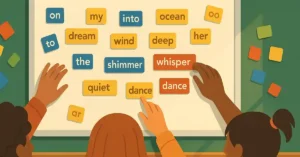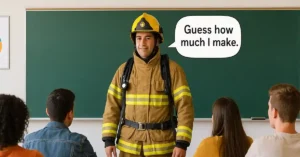Welcome to our comprehensive resource hub dedicated to the dynamic world of differentiated instruction. Here, educators, researchers, and curious minds alike will find a curated selection of articles that delve deep into the principles and practices of differentiated teaching. Whether you’re a seasoned educator seeking to refine your approach or a new teacher exploring ways to address the diverse needs of your students, this collection offers valuable insights, innovative strategies, and real-world examples. Our goal is to empower you with knowledge and tools to create an inclusive, engaging, and effective learning environment for every student. Dive into our articles to unlock the full potential of differentiated instruction in your classroom!

Poetry Jenga: A Fun, Interactive Way to Teach Poetry in the Classroom
If you’ve ever tried teaching poetry to middle or high school students and been met with groans, sighs, or blank stares, you’re not alone. Poetry can feel intimidating, abstract, or—dare I say it?—boring to students who haven’t found their poetic groove. But what if I told you there’s a way

Professional Timeline Lesson Plan: Guiding Students From Classroom to Career
If you’ve ever fielded the classic “When will we ever use this?” question, a professional timeline lesson delivers the answer in bold, neon letters. By asking students to research and plot the schooling, trainings, and real-world experiences required for a chosen career, you help them connect classroom learning to tangible

Story to Poem: Turning Tales into Poetry
I’ve always loved watching students experience that lightning-bolt moment when a text suddenly feels alive in their hands. The Story to Poem activity delivers those moments in bunches. By asking learners to remodel a piece of prose into verse, we press all the right buttons at once: close reading, inference,

Metacognitive Reading Strategies Every Teacher Should Try
I’ve spent two decades watching students zip through pages without really thinking about what they’re reading—like driving on autopilot and missing every landmark. Metacognitive reading strategies switch off that cruise control. They invite students to notice their thinking, steer it intentionally, and arrive at meaning on purpose. In this post,

Magnetic Poetry Lesson Plan: Turn Your Whiteboard into a Poem-Making Factory
Harnessing this power in the classroom need not be complicated. With a magnetic board and a thoughtfully selected set of word tiles, you can create a dynamic environment in which students explore poetic structure, refine word choice, and collaborate with ease. The lesson plan below provides clear objectives, materials, and

Career Day Role Play Lesson: An Engaging Career Game
Choosing a career path can feel overwhelming for students, especially when their knowledge of the working world is limited to what they see around them. One of the most exciting ways to expand their understanding—and spark curiosity—is through an engaging career day role play lesson. This activity not only introduces

Unlock Better Memory with a Mnemonic Device Generator
Need a fast and fun way to remember complex information? Our AI-powered mnemonic device generator creates custom memory aids in seconds—just enter your topic or list, and let the brain-hacking magic begin! Whether you’re cramming for a test, teaching a tricky concept, or trying to recall random facts at a

Acrostic Poetry Lesson Plan: The Acrostic Race
(Spoiler: It’s part poetry slam, part Mario Kart, and 100 percent classroom gold.) Why Run an Acrostic Race? Mnemonic power – Encoding ideas letter-by-letter creates high-quality memory cues, improving recall by up to 20 percent Verywell Mind. Vocabulary growth – Classroom studies show acrostic writing measurably lifts word-choice sophistication and

Salary Guess Game: Exploring Wage Disparities Across Professions
Understanding the factors that influence salaries is crucial for students as they prepare for their future careers. The “Salary Guess Game” is an interactive classroom activity that encourages students to explore wage disparities across various professions. By estimating and ranking salaries, students gain insights into how education, demand, experience, and

